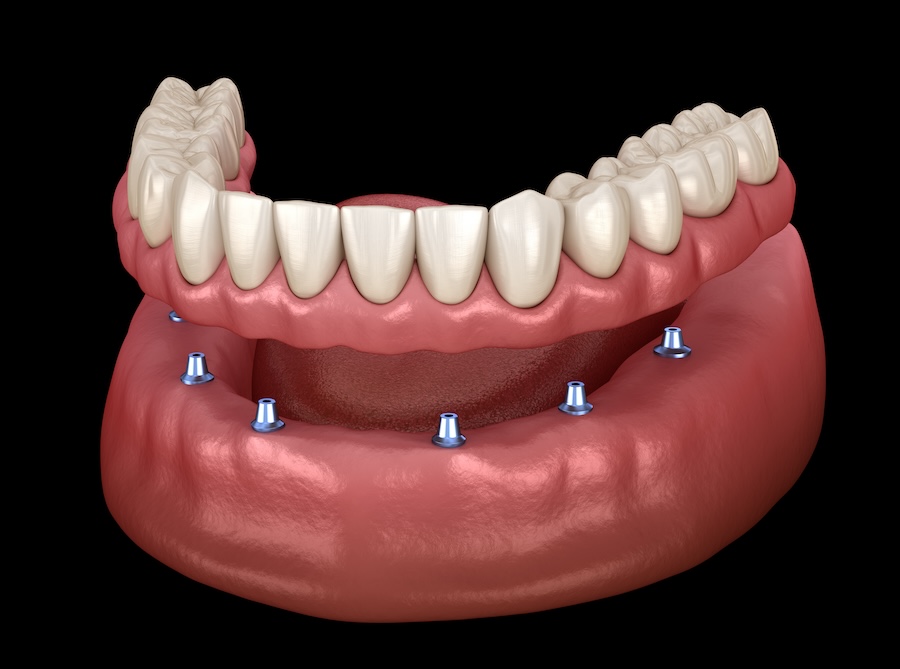
Dentures vs. Dental Implants: Which is Right for You?
September 7, 2024 9:00 amIf you’re missing teeth, you’ve probably come across two main replacement options: dentures and dental implants. Both are reliable solutions, but they come with different procedures, costs, maintenance, and long-term implications. In this post, we’ll walk you through these differences so you can talk to your dentist with confidence.
Dentures: A Tried-and-True Option
Dentures have been around for decades and are a common solution for replacing missing teeth. These are removable prosthetic teeth that rest on your gums or, in the case of partials, are clipped or anchored to remaining teeth. They come in two broad varieties:
Full dentures: replace all teeth in the upper or lower arch.
Partial dentures: replace a few missing teeth and use clasps or attachments connected to remaining teeth.
Cost-Effective: Dentures are generally more affordable upfront than dental implants.
Non-Surgical: Unlike implants, dentures don’t require any surgery, making them a less invasive option.
Quick Solution: Dentures can be made relatively quickly, providing a fast way to restore your smile.
Pros of Dentures:
Less Stability: Dentures can sometimes slip or move, especially while eating or talking.
Bone Loss: Because dentures don’t stimulate the jawbone like implants do, bone deterioration can occur over time.
Maintenance: Dentures need to be removed for cleaning and may require adjustments or replacements as your mouth changes.
Less Comfort: A removable appliance may feel less like “your own teeth” and more like a prosthesis.
Cons of Dentures:
Dental Implants: A Long-Term Investment
Dental implants are titanium posts surgically placed into the jawbone, acting as a replacement for natural tooth roots. Implants are ideal for those looking for a more permanent and stable solution to missing teeth. The different types of dental implants include:
Single crown: for one missing tooth.
Bridge: for several missing teeth.
Full arch prosthesis: where multiple implants support an entire arch of teeth.
Implant-supported denture: where implants anchor a removable denture.
Stability: Implants are fixed in place and don’t move or slip, making them feel more like natural teeth.
Bone Health: Because implants fuse with the jawbone, they help maintain bone density and prevent bone loss.
Longevity: With proper care, implants can last a lifetime, making them a long-term investment.
Pros of Dental Implants:
Higher Cost: Implants typically cost more upfront than dentures, though many patients find the long-term benefits worth the investment.
Surgical Procedure: Dental implants require surgery and a longer healing period compared to dentures.
Time-Intensive: The implant process can take several months, as it involves surgery, healing, and placement of the final restoration.
Cons of Dental Implants:
Which Option is Right for You?
The decision between dentures and dental implants isn’t always an easy one. Some key factors to consider are:
Oral health & bone structure: Dental implants require sufficient jawbone density and healthy gums. If bone volume is low, you may require bone grafting or an alternate plan such as zygomatic dental implants. Dentures can often be used even when bone density is limited.
Overall health & habits: Good overall health is an important factor in surgical outcomes. Conditions like diabetes, heavy smoking, and certain medications may reduce success for dental implants. For medically compromised patients, dentures may be the safer option.
Lifestyle & comfort: For those who are active and eat a more varied diet, dental implants will often be the better choice. For those that are comfortable with removal and maintenance, dentures might be fine.
Budget: Budget is typically the most important factor when deciding between dental implants and dentures. While dentures cost less initially, remember that they may need to be replaced every 5-10 years (or sooner) depending on changes in your mouth and bone. Dental implants can sometimes be more cost-effective over a lifetime.
Personalized Solutions at High Point Dentistry in Austin & Round Rock, TX
At High Point Dentistry in Austin and Round Rock, our dedicated team of dental professionals is here to help you make the best decision for your oral health. Whether you’re considering dentures, dental implants, or another solution, we’ll provide a personalized consultation to find what works best for your needs. Contact us today to schedule an appointment!
Contact UsCategorised in: Restorative Dentistry

